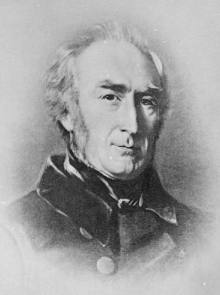Jean-Jacques Baude
| Jean-Jacques Baude | |
|---|---|
 |
|
| Born | Valence, Drôme, France |
| Died | Paris, France |
| Nationality | French |
| Occupation | Administrator, politician |
Jean-Jacques Baude (19 February 1792 - 6 February 1862) was a French administrator and politician. He was a deputy from 1830 to 1839, and again from 1842 to 1846.
Baron Jean-Jacques Baude was born in Valence, Drôme on 19 February 1792, where his father was Attorney General. He started work in his father's office in the prefecture of Tarn. Towards the end of the reign of Napoleon he joined the administration. He was appointed in turn sub-prefect of Confolens on 8 April 1813, sub-prefect of Roanne on 2 November 1814 and sub-prefect of Saint-Étienne on 4 June 1815. Baude recognized Louis XVIII of France in the first restoration, but on the return of Napoleon placed himself at the head of the guards who opposed the advance of the Duke of Angoulême on Lyon.
After the battle of Waterloo he resigned and published Le Lundi gras et le mercredi des Cenres (Fat Monday and Ash Wednesday), which was condemned by the royal court of Grenoble. He then became involved in financing public works. He wrote a remarkable work on Navigation de la Loire au-dessur de Briare in 1826. He continued to attack the government in the liberal press. As editor of Le Temps he signed the protest of journalists against the ordinances of King Charles X of France.
The July Revolution, which brought his political friends to power, at first gave Baude an important place in the Orléanist party. He was named Secretary of the Municipal Commission of Paris on 29 July 1830. On 1 August 1830 he was named Secretary General of the Ministry of the Interior, and for a few days was acting Minister until François Guizot took the portfolio on 11 August 1830. He was then general director of bridges and roads, and of mines, and Councillor of State. On 28 October 1830 he was elected a Deputy for the department of the Loire. On 10 November, when the Count of Montalivet succeeded Guizot, Baude was appointed Under-Secretary of State for the Interior. On 26 December 1830 he replaced Treilhard at the Prefecture of Police, and remained in charge until 25 February 1831.
...
Wikipedia
